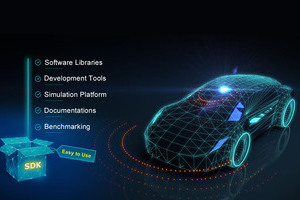Renesas accelerates deep learning development for ADAS and automated driving applications

Renesas Electronics Corporation, a supplier of advanced semiconductor solutions, unveiled the R-Car Software Development Kit (SDK), a complete software platform in a single package that enables quicker and easier software development and validation for smart camera and automated driving applications used in passenger, commercial, and off-road vehicles.
“Software development and delivery has been a significant pain point for automotive system developers, involving resource-intensive customised packaging and full installations that typically take several days to complete,” says Naoki Yoshida, vice president, automotive digital products marketing division at Renesas.
“To alleviate these headaches when it comes to deep learning for automotive systems, Renesas is reinventing the developer experience, offering this new single package, multi-OS software platform that is easy for customers to access, learn, use, and install, enabling customers to quick start their deep learning development.”
Re-inventing SW development for automotive applications
Automakers are increasingly turning to deep learning as they look for new ways to enable smart camera applications and automated driving systems for next-generation vehicles. However, most deep learning solutions available today are built on consumer or server applications, which do not operate under the same stringent constraints for functional safety, real-time responsiveness, and low power consumption.
Optimised for use with Renesas’ state-of-the-art R-Car V3H and R-Car V3M system-on-chips (SoCs), the new R-Car SDK is built for rule-based automotive computer vision and AI-based functions. The simulation platform offers both AI and conventional hardware accelerators for highly accurate simulations in real time.
Renesas will continue to strengthen this virtual platform over time. A full suite of development PC-based tools is delivered for both Windows and Linux as well as multiple libraries, including support for deep learning, computer vision, video codecs, and 3D graphics. Besides Linux, the new SDK also supports multiple ASIL-D-compliant operating systems (e.g., QNX, eMCOS, and INTEGRITY) in a single package.
e² studio for R-Car integrated software development environment
Renesas offers a special version of its e² studio for the R-Car V series that focuses on the creation of high-performance, real-time computer vision applications for ADAS and automated driving. The open-source Eclipse-based development environment includes a full set of debug features and a cutting-edge e² studio GUI that allows users to easily customise and integrate third-party tools. It also supports bus monitoring and debug functionalities for image processing and deep learning subsystems.
Easy to start, access, use, and develop
The new R-Car SDK also includes a full set of software samples, popular CNN networks, a workshop, and application notes, which makes it easier for Renesas R-Car platform newcomers to access the technology and enable a quick start for development. It is also an ideal platform for benchmarking Renesas products and select the most appropriate SoC for customers’ target application.
Thanks to the automatic installer, all the software libraries and the development environment can be launched quickly on a development workstation. Applications developed and designed on a PC can be seamlessly ported to embedded development hardware. Finally, Renesas’ R-Car partner ecosystem the R-Car Consortium will have access to the R-Car SDK for integration into their R-Car solution roadmap.
Customers can also combine the R-Car V series and SDK with Renesas’ high-performance, low-power RH850 microcontrollers and automotive power management products to further streamline hardware design efforts, reduce functional safety validation requirements, and reduce power consumption for smart cameras and other computer vision-based applications. For more information on Renesas automotive Winning Combinations, go here.
The R-Car SDK is available now. For more information, please visit here.
Comment on this article below or via Twitter @IoTGN
